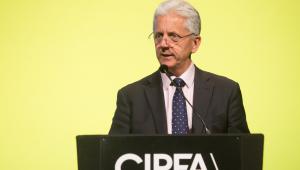07 November 2008
By Tash Shifrin
The government's abandonment of its fiscal rules and new readiness to borrow have prompted questions from economists, as new figures showed a year-on-year fall in the UK's gross domestic product.
Chancellor Alistair Darling's adoption of Keynesian economics also came under fire from the Conservatives, with shadow chancellor George Osborne outlining their strategy for the economy.
GDP estimates released by the National Institute for Economic and Social Research on November 6 showed that output fell by 0.5% in the three months ending in October.
NIESR said: 'It means that the output level in October is now below the level of October 2007 although the figures for individual months are inevitably volatile. This is the first time that this has happened since the 1990 recession.'
Darling signalled a new readiness to borrow and the scrapping of the government's fiscal rules – which had set a ceiling for debt at 40% of GDP – in his Mais lecture last month. He had earlier suggested that planned public sector capital projects could be 'brought forward' to help boost the economy.
But the chancellor has provided scant detail of his plans ahead of the Pre-Budget Report. Jonathan Loynes, chief European economist at analyst firm Capital Economics, said the government had a choice about where money raised by rising borrowing would go, although it seemed to be 'leaning towards' boosting public spending rather than cutting taxes.
Bringing forward planned capital projects would have 'some appeal' because it was capital rather than current expenditure, Loynes said. But he cautioned that there was a 'downside' to this strategy.
'It won't have the big impact on economic activity that a tax cut might have, simply because it takes time for capital spending to come on stream,' he warned.
Tax cuts would 'have a better chance of succeeding' and would be 'much more immediate', but there was no guarantee that even this would work, Loynes said.
Peter Holmes, reader in economics at the University of Sussex and an advocate of Keynesian policy, said that after 15 years of a consumer-led boom, there were 'reasons for fearing collapse' of this strategy. He favoured infrastructure development schemes to lift the economy, rather than tax cutting.
Outlining the Conservatives' strategy at the London School of Economics on October 31, George Osborne said increasing borrowing was 'the inevitable consequence of recession, not a strategy to fight it'.
Darling had abolished the fiscal rules but 'not replaced them with anything', he argued. He also proposed 'timely and targeted intervention through the tax system to help families and businesses through difficult times', with a council tax freeze and permission for businesses to defer VAT payments for six months.
'Evidence from around the world suggests that tackling recession with big spending does not work. The timing is almost always too late. Value for money is often very poor,' Osborne said.
PFnov2008



















